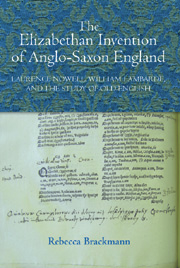 The Elizabethan Invention of Anglo-Saxon England
The Elizabethan Invention of Anglo-Saxon England Book contents
- Frontmatter
- Contents
- List of Illustrations
- Dedication
- Acknowledgements
- Chapter 1 The Anglo-Saxonists and Their Books: Print, Manuscript, and the Circulation of Scholarship
- PART I ANGLO-SAXON TEXTS AND SIXTEENTH-CENTURY ENGLISH
- PART II CHOROGRAPHIES AND THE PAST OF ENGLAND
- Chapter 4 Somewhere in Time: The Abcedarium Place-Name Index
- Chapter 5 Putting the Past in Place: Lambarde's Alphabetical Description and Perambulation of Kent
- Chapter 6 Images and Imaginings of England
- PART III OLD ENGLISH AND THE COMMON LAW
- Conclusion: The Invention of Anglo-Saxon England
- Bibliography
- Index
- Title in the Series
Chapter 4 - Somewhere in Time: The Abcedarium Place-Name Index
from PART II - CHOROGRAPHIES AND THE PAST OF ENGLAND
Published online by Cambridge University Press: 05 February 2013
- Frontmatter
- Contents
- List of Illustrations
- Dedication
- Acknowledgements
- Chapter 1 The Anglo-Saxonists and Their Books: Print, Manuscript, and the Circulation of Scholarship
- PART I ANGLO-SAXON TEXTS AND SIXTEENTH-CENTURY ENGLISH
- PART II CHOROGRAPHIES AND THE PAST OF ENGLAND
- Chapter 4 Somewhere in Time: The Abcedarium Place-Name Index
- Chapter 5 Putting the Past in Place: Lambarde's Alphabetical Description and Perambulation of Kent
- Chapter 6 Images and Imaginings of England
- PART III OLD ENGLISH AND THE COMMON LAW
- Conclusion: The Invention of Anglo-Saxon England
- Bibliography
- Index
- Title in the Series
Summary
Archbishop matthew parker, in the preface to his 1574 edition of Asser's Life of Alfred, explains that he has chosen to set the (Latin) text in an ‘Anglo-Saxon’ typeface imitating insular minuscule script to help his reader begin to learn Old English. One of the reasons that knowing Old English is beneficial, he argues, is that it will help with local etymology:
quanta huius linguae studioso voluptas erit (& vt periucunda, ita non multi sane laboris) scire, omnium ciuitatum, vrbium, montium, syluarum, fluminum, & viarum nomina, & haec vniuersa vnde deriuentur, & quo quidque quasi e fonte profluxerit intelligere.
[what a great pleasure it will be for him who studies this language (and just as it will be pleasant, so too it will not require great labor) to know the names of all towns, cities, mountains, forests, rivers, and roads, and whence all these derive, and to understand from where each one of them flowed, as if from a spring.]
Parker, however, does not go on to explain why one would want to learn the ancient place names or understand the derivations of modern ones; this, apparently, is self-explanatory to him. The drive to understand local names was so ingrained as to be invisible to Parker, at least, and probably to many of his contemporaries. It could motivate people to learn Old English, but what motivated it? The next three chapters will examine Nowell's and Lambarde's research into place names and local history and how they interacted with the discourses that impelled the early modern vogue for chorography, of which place-name etymology is a part.
- Type
- Chapter
- Information
- The Elizabethan Invention of Anglo-Saxon EnglandLaurence Nowell, William Lambarde, and the Study of Old English, pp. 87 - 119Publisher: Boydell & BrewerPrint publication year: 2012
